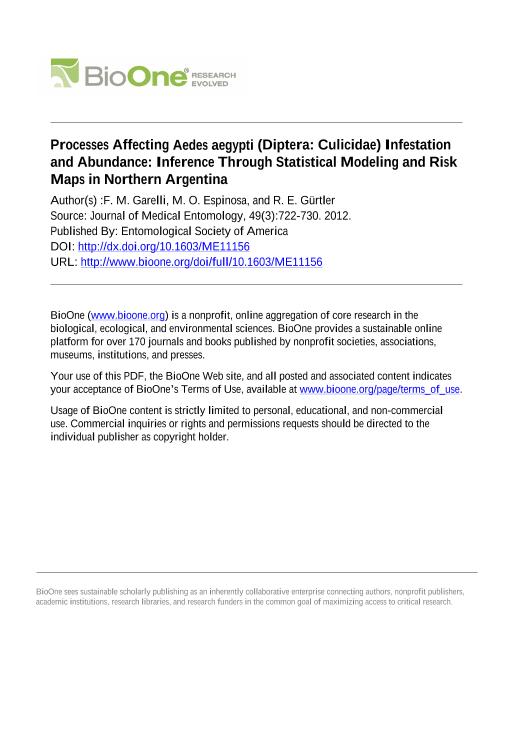Artículo
Processes affecting Aedes aegypti (Diptera: Culicidae) infestation and abundance: Inference through statistical modeling and risk maps in northern Argentina
Fecha de publicación:
05/2012
Editorial:
Entomological Society of America
Revista:
Journal of Medical Entomology
ISSN:
0022-2585
Idioma:
Inglés
Tipo de recurso:
Artículo publicado
Clasificación temática:
Resumen
Understanding the processes that affect Aedes aegypti (L.) (Diptera: Culicidae) may serve as a starting point to create and /or improve vector control strategies. For this purpose, we performed statistical modeling of three entomological surveys conducted in Clorinda City, northern Argentina. Previous 'basic' models of presence or absence of larvae and/or pupae (infestation) and the number of pupae in infested containers (productivity), mainly based on physical characteristics of containers, were expanded to include variables selected a priori reflecting water use practices, vector-related context factors, the history of chemical control, and climate. Model selection was performed using Akaike's Information Criterion. In total, 5,431 water-holding containers were inspected and 12,369 Ae. aegypti pupae collected from 963 positive containers. Large tanks were the most productive container type. Variables reflecting every putative process considered, except for history of chemical control, were selected in the best models obtained for infestation and productivity. The associations found were very strong, particularly in the case of infestation. Water use practices and vector-related context factors were the most important ones, as evidenced by their impact on Akaike's Information Criterion scores of the infestation model. Risk maps based on empirical data and model predictions showed a heterogeneous distribution of entomological risk. An integrated vector control strategy is recommended, aiming at community participation for healthier water use practices and targeting large tanks for key elements such as lid status, water addition frequency and water use.
Palabras clave:
Aedes Aegypti
,
Akaike'S Information Criterion
,
Dengue
,
Vector Control
Archivos asociados
Licencia
Identificadores
Colecciones
Articulos(IEGEBA)
Articulos de INSTITUTO DE ECOLOGIA, GENETICA Y EVOLUCION DE BS. AS
Articulos de INSTITUTO DE ECOLOGIA, GENETICA Y EVOLUCION DE BS. AS
Citación
Garelli, Fernando Miguel; Espinosa, M. O.; Gurtler, Ricardo Esteban; Processes affecting Aedes aegypti (Diptera: Culicidae) infestation and abundance: Inference through statistical modeling and risk maps in northern Argentina; Entomological Society of America; Journal of Medical Entomology; 49; 3; 5-2012; 722-730
Compartir
Altmétricas




